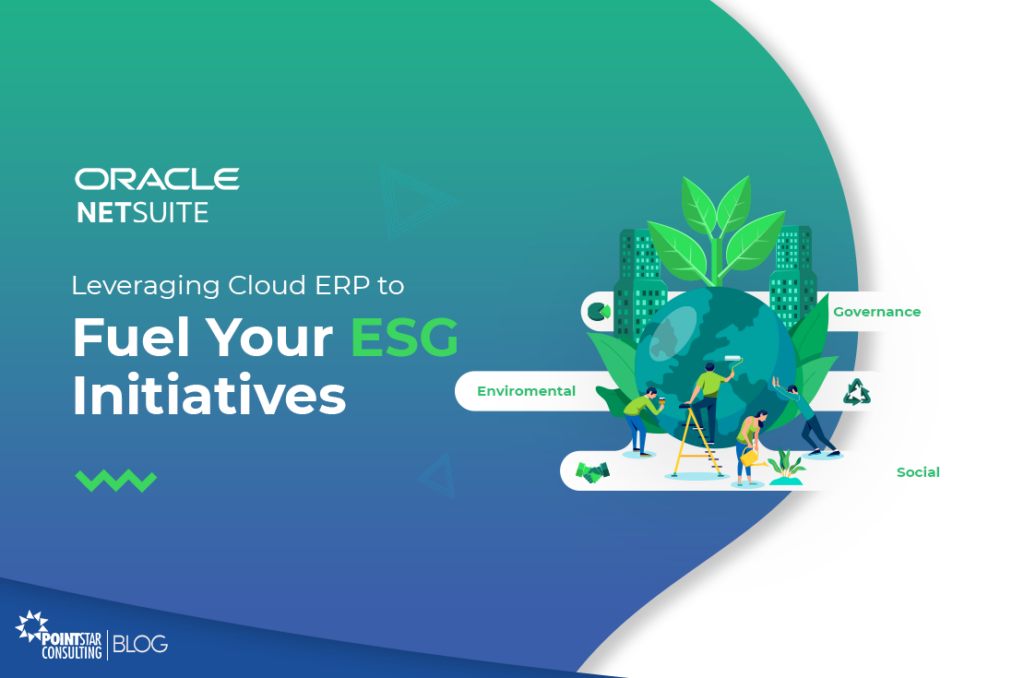Environmental, Social, and Governance (ESG) initiatives have become essential for companies looking to thrive in a socially conscious and environmentally responsible world. ESG considerations are no longer just about meeting regulatory requirements; they are increasingly seen as a source of competitive advantage, risk mitigation, and long-term sustainability.
Cloud solutions like an enterprise resource planning (ERP) system can help businesses navigate the complex realm of ESG, providing the tools needed to excel in these areas and drive sustainable growth.
Understanding ESG
ESG is a framework that assesses a company’s performance in three key areas:
Environmental
This dimension evaluates a company’s impact on the environment, including its carbon footprint, resource consumption, and efforts to mitigate environmental risks.
Social
The social aspect looks at how a company manages relationships with its employees, customers, suppliers, and the communities it operates in. This includes diversity and inclusion, labour practices, and community engagement.
Governance
Governance measures the company’s leadership, ethics, and transparency. It encompasses corporate governance practices, executive compensation, and adherence to ethical standards.
ESG Benefits for Businesses
Investing in ESG initiatives brings several benefits to businesses:
Enhanced Reputation
Companies with strong ESG practices are often viewed more favourably by customers, investors, and the public, which can enhance their brand reputation.
Reduced Risk
ESG-focused companies are better equipped to identify and mitigate potential risks, such as regulatory fines, supply chain disruptions, and reputational damage.
Attracting Investment
ESG-conscious investors are increasingly seeking opportunities to invest in companies committed to sustainability, potentially lowering the cost of capital.
Long-term Sustainability
ESG initiatives can drive long-term business sustainability by fostering innovation, reducing operational costs, and creating a positive corporate culture.
Leveraging a Cloud ERP System Like Oracle NetSuite to Propel ESG Efforts
Oracle NetSuite is a robust ERP system that can support businesses in their ESG journey through various means:
Data Management
Oracle NetSuite helps collect, manage, and analyse data related to ESG metrics. This enables businesses to track and report on their environmental impact, social responsibility efforts, and governance practices accurately.
Supply Chain Visibility
The system offers real-time visibility into supply chain operations, helping companies identify areas for improvement in sustainability, such as reducing waste, optimising logistics, and sourcing ethically.
Financial Efficiency
Oracle NetSuite streamlines financial processes, allowing businesses to allocate resources efficiently to support ESG initiatives and make data-driven decisions that minimise costs.
Compliance and Reporting
Oracle NetSuite’s reporting capabilities enable businesses to comply with ESG reporting standards and regulations while ensuring transparency and accuracy in disclosures.
Risk Mitigation
By providing real-time data and analytics, Oracle NetSuite helps companies identify and mitigate ESG-related risks, protecting both their reputation and financial stability.
In a Nutshell
Incorporating ESG principles into your business strategy is no longer optional; it’s a necessity for long-term success. Oracle NetSuite serves as a valuable tool for businesses looking to excel in their ESG initiatives.
By efficiently managing data, optimising operations, and fostering transparency, Oracle NetSuite empowers organisations to build a sustainable and socially responsible future while reaping the benefits of enhanced reputation, reduced risk, and increased investment opportunities.



